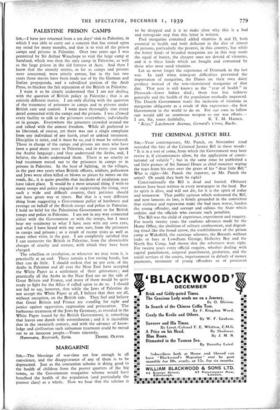PALESTINE PRISON CAMPS
SI11,—I have just returned from a ten days' visit to Palestine, in which I was able to carry out a concern that has rested upon
my mind for many months, and that is to visit all the prison camps and prisons in Palestine. Over two years ago I was permitted by Sir Arthur Wauchope to visit the large camp at Sarafand, which was then the only camp in Palestine, as well as the large prison in the old fortress at Acre. And then I know that the atrocity stories, as far as camps and prisons were concerned, were utterly untrue, but in the last two years those stories have been made use of by the German and Italian propaganda, and a subsidised portion of the Arab Press, to blacken the fair reputation of the British in Palestine.
I want it to be clearly understood that I am not dealing with the question of British policy in Palestine ; that is an entirely different matter. I am only dialing with the question of the treatment of prisoners in camps and in prisons under British care and control. I went most thoroughly into every detail connected with the camps and the prisons. I was allowed every facility to talk to the prisoners everywhere, individually or in groups. Everywhere the prisoners crowded around me and talked with the utmost freedom. While all preferred to be liberated, of course, yet there was not a single complaint from any individual of any harsh, cruel or unkind treatment. Discipline is strict, and it must be so, and it must be enforced. Those in charge of the camps and prisons are men who have been a good many years in Palestine, and in every case speak the Arabic language ; and they understand the Arabs, and, I believe, the Arabs understand them. There is no cruelty or bad treatment meted out to the prisoners in camps or in prisons in Palestine. In the heat of fighting, in the villages, in the past two years when British officers, soldiers, policemen and Jews were often killed or blown to pieces by mines on the roads, &c., it is quite possible that incidents of retaliation may have taken place. It would be a most unusual thing if with so many troops and police engaged in suppressing the rising, over such a wide and difficult country, their patience should not have given way at times. But that is a very different thing from suggesting a Government policy of harshness and revenge on behalf of the British troops and police in Palestine. I hold no brief for the Palestinian Government or for British troops and police in Palestine. I am not in any way connected either with the Government or with the troops, but I must bear my testimony to what I have seen with my own eyes, and what I have heard with my own ears, from the prisoners in camps and prisons ; as a result of recent visits as well as many other visits in the past. I am completely satisfied that I can exonerate the British in Palestine, from the abominable charges of cruelty and torture, with which they have been charged.
The rebellion or revolution, or whatever we may term it, is practically at an end. There remain a few roving bands, but they can do little. I should reckon that 90 per cent. of the Arabs in Palestine and all over the Near East have accepted the White Paper as a settlement of their grievances ; and practically all the Arabs in the Near East are on the side of Great Britain and France, and many of them would be quite ready to fight for the Allies if called upon to do so. I should not fail to say, however, that while the Jews of Palestine do not accept the White Paper at all, I believe that they are all, without exception, on the British side. They feel and believe that Great Britain and France are standing for right and justice against aggression, oppression and persecution. The barbarous treatment of the Jews by Germany, as revealed in the White Paper issued by the British Government, is something that leaves one dumb with astonishment ; and it is incredible that in the twentieth century, and with the advance of know- ledge and civilisation such unhuman treatment could be meted out to an innocent people.—Yours sincerely,












































 Previous page
Previous page